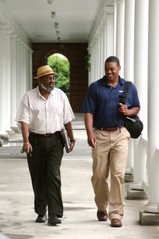
Collaboration between the Modern Language Department and the Office of Disability Resources is a key element of Project LINC
The 2007 release of a report by the Modern Language Association, “Foreign Languages and Higher Education: New Structures for a Changed World,” has focused renewed attention on foreign language instruction at the introductory level.
Frequently, the report finds, these beginning courses are taught by part-time and untenured instructors, many of whom remain on the fringes of the department, with little access to ongoing support, pedagogical training, or faculty development. When students with sensory, cognitive or physical disabilities are introduced to this environment, the results can be frustrating for both the student (who may benefit from specific instructional strategies or accommodations) and the instructor (who may be ill-equipped to provide inclusive instruction).
To address this problem, Project LINC is developing a portable and sustainable training curriculum to support new, part-time, and temporary foreign language instructors in inclusive classroom techniques. The project follows a three-year structure:
- Year One: A Leadership and Development Team (LDT) of experienced foreign language faculty assisted project investigators in developing and evaluating instructional strategies that reflect effective application of The Standards for Foreign Language Learning (SFLL) and Universal Design for Instruction (UDI). The main goal of the LDT was to guide and direct the initial stages of the project’s curriculum.
- Year Two: (The project focused on faculty training based on SFLL, UDI, and data-based instruction. The resulting curriculum consists of (1) a Foundation Workshop, (2) Topical Training modules, (3) Support Materials, and (4) Evaluation and Feedback Tools that will be produced in hard copy, electronic, and on-line formats.
- Year Three: Project investigators worked with the second cohort of faculty to fine-tune the curriculum.
In addition to developing the training curriculum, project investigators gather information in the following areas:
- Student Focus Groups: Investigators conducted focus groups to gather information about learning experiences and perceived classroom climate in foreign language courses.
- Student Interviews: Using a structured interview format, investigators interviewed seven students with diverse disabilities. Students answered questions about learning foreign languages at college and in other environments.
- Faculty Participant Feedback and Reflections: A core group of new, part-time, and temporary foreign language instructors at Longwood University have participated in the Foundation Workshop and six Topical Workshops that will comprise the core Project LINC training curriculum.
In the future, we hope to provide training and curricula to foreign language instructors in area colleges, community colleges, and high schools. We plan to continue to disseminate the curriculum nationally through professional organizations, conferences, publications, and the Project LINC website.